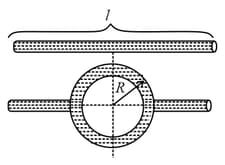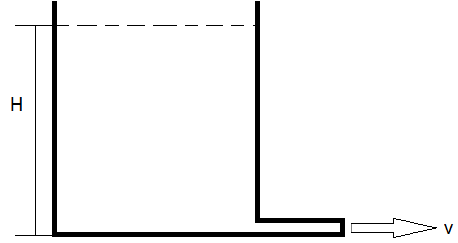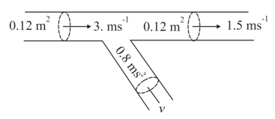Critical Velocity and Reynolds Number
Critical Velocity and Reynolds Number: Overview
This topic covers concepts, such as, Critical Velocity,Rate of Flow of a Fluid or Discharge 'Q',Condition for Laminar Flow etc.
Important Questions on Critical Velocity and Reynolds Number
If is the density and is coefficient of viscosity of fluid which flows with a speed in the pipe of diameter , the correct formula for Reynolds number is
A pump can push a viscous oil through a long straight pipe of length with the flow rate of . Now a part of the middle section of the pipe is replaced by a ring-shaped section of mean radius having the same internal cross-section as that of the pipe. If the same pump is used to push oil through this modified pipe then what will be the flow rate.

In the equation What does mean ?
For sharp edge orifice co- efficient of discharge lies between
Coefficient of discharge is the ________of actual discharge to the theoretical discharge.
Coefficient of discharge is used to measure _______
The ratio of inertial force to viscous force represents:
Define critical velocity?
. A beaker contains water up to a certain height as shown. If the water is allowed to get discharged through a small pipe (of a uniform diameter), what type of flow will it be in the pipe ?
The flow rate of water from a tap of diameter is litres per minute. If coefficient of viscosity of water is the nature of flow is ________
Water from a pipe is coming at a rate of liters per minute. If the radius of the pipe is the Reynolds number for the flow is of the order of: (density of water = coefficient of viscosity of water
Water from a pipe is coming at a rate of liters per minute. If the radius of the pipe is the Reynolds number for the flow is of the order of: (density of water = coefficient of viscosity of water
Which of the following statements is true in the context of inertial force?
This force is the driving force in fluids.
A liquid is flowing in a horizontal uniform capillary tube under a constant pressure difference . The value of pressure for which the rate of flow of the liquid is doubled when the radius and length both are doubled is
Water flows in a streamlined manner through a capillary of radius 'a', the pressure difference being and the rate of flow . If the radius is reduced to and the pressure increased to , the rate of flow becomes:
An incompressible liquid travels as shown in the figure. The speed of the fluid in the lower branch will be,

Which figure shows the laminar flow of an ideal liquid?
What would be the Reynolds number if the flow is streamlined?
What would be the Reynolds number if the flow is turbulent?
